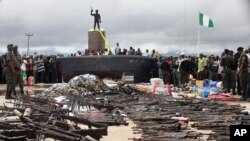ABUJA - Former militants in Nigeria’s oil-rich Niger Delta complain the amnesty program set up to help them integrate into society is failing. The 2009 program is praised for bringing peace to what was a battle zone, but former militant leaders say many of their men feel like they are not getting a fair deal. The militant leaders are threatening renewed violence.
Three years ago the Niger Delta was a war zone. Militants said they were fighting for a share of the region’s mammoth oil wealth.
But in 2009 the militants and the government struck a deal: the militants agreed to lay down their arms for cash payments and other benefits like health care and programs that would teach job skills. General Tom Bush, a former militant, says originally the peace was beneficial to all.
"It is because of the amnesty they granted us that we decided to leave the violence and embrace the amnesty," he said.
Bush says the amnesty program could work if it is distributed equitably. But, he says, the first round of militants who turned in their weapons got cash and job training. He says the second wave - more than 6,000 fighters - have not been trained and are getting less money than they were promised.
General Don Thomas, another former militant, says this is sparking anger among the former militants -- against the government, and against the first wave of militants.
"The federal government recognizes the first phase more than the second phase, which is bad because we are all in the same struggle," said Thomas. "If today the federal government is going to give us jail times, we are going to face equal charges."
In recent months, the peace in the Niger Delta has shown signs of unraveling, with increased attacks on oil pipelines. University of Abuja senior lecturer Abubakar Umar Kari says part of the problem is the government failure to properly manage the funds for the program.
Another part of the problem, he says, is that with cash payments going to former fighters, anyone can claim to be a fighter to make some money.
"A plain, unemployed youth who was never involved in any militancy, realizing that they could easily make money by claiming or pretending to be militants, have been going into the militant camps and so on and demanding that they too should be accommodated within the amnesty program," said Kari.
Nigeria is Africa’s largest oil exporter, producing some 2.4 billion barrels a day. The oil comes from the Niger Delta, but the United Nations says the region suffers from “high unemployment, social deprivation, abject poverty, filth and squalor.”
Lawyer Ignatius Onwuemele says as long as these issues are not addressed, the Niger Delta will be in danger of war.
"The government does not make efforts," he said. "There is no effort on the part of the federal government to solve some of the social problems we're having."
Onwuemele says that even former militants that have received job training are not finding jobs.
Hilary Uguru contributed to this report from Warri, Nigeria
Three years ago the Niger Delta was a war zone. Militants said they were fighting for a share of the region’s mammoth oil wealth.
But in 2009 the militants and the government struck a deal: the militants agreed to lay down their arms for cash payments and other benefits like health care and programs that would teach job skills. General Tom Bush, a former militant, says originally the peace was beneficial to all.
"It is because of the amnesty they granted us that we decided to leave the violence and embrace the amnesty," he said.
Bush says the amnesty program could work if it is distributed equitably. But, he says, the first round of militants who turned in their weapons got cash and job training. He says the second wave - more than 6,000 fighters - have not been trained and are getting less money than they were promised.
General Don Thomas, another former militant, says this is sparking anger among the former militants -- against the government, and against the first wave of militants.
"The federal government recognizes the first phase more than the second phase, which is bad because we are all in the same struggle," said Thomas. "If today the federal government is going to give us jail times, we are going to face equal charges."
In recent months, the peace in the Niger Delta has shown signs of unraveling, with increased attacks on oil pipelines. University of Abuja senior lecturer Abubakar Umar Kari says part of the problem is the government failure to properly manage the funds for the program.
Another part of the problem, he says, is that with cash payments going to former fighters, anyone can claim to be a fighter to make some money.
"A plain, unemployed youth who was never involved in any militancy, realizing that they could easily make money by claiming or pretending to be militants, have been going into the militant camps and so on and demanding that they too should be accommodated within the amnesty program," said Kari.
Nigeria is Africa’s largest oil exporter, producing some 2.4 billion barrels a day. The oil comes from the Niger Delta, but the United Nations says the region suffers from “high unemployment, social deprivation, abject poverty, filth and squalor.”
Lawyer Ignatius Onwuemele says as long as these issues are not addressed, the Niger Delta will be in danger of war.
"The government does not make efforts," he said. "There is no effort on the part of the federal government to solve some of the social problems we're having."
Onwuemele says that even former militants that have received job training are not finding jobs.
Hilary Uguru contributed to this report from Warri, Nigeria





